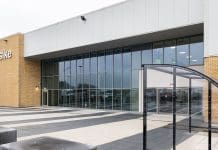A new public highway resurfacing trial in Chelmsford, Essex, aims to increase the lifespan of roads with a new strengthening compound
Essex County Council is working on the new public highway resurfacing trial in Chelmsford with Ringway Jacobs, which supplies highway services in Essex.
It is hoped the addition of a new strengthening compound to traditional surfacing material could increase the lifespan of roads by up to double. This would greatly reducing future maintenance, and the associated traffic delays, as well as halving the carbon footprint associated with such work.
Ringway Jacobs has brought in the specialist asset management consultancy Jean Lefebvre UK (JLUK), and partners, to undertake the trial.
The new compound includes graphene and is more resistant to temperature changes
Key to the innovation is a technology called Gipave, developed by the Italian company Iterchimica. It consists in adding an advanced product to a traditional surfacing material, in this case, for the first time in UK, a hot rolled asphalt (HRA).
Gipave contains graphene – which is 200 times stronger than steel yet extremely flexible. This makes the asphalt far less susceptible both to hardening and cracking in cold temperatures and softening in warm temperatures. It also increases the elasticity and strength to reduce the wear, particularly under high loading.
Gipave further reduces environmental impacts and carbon emissions as it contains a specific type of selected hard plastic, which is usually considered non-reusable, avoiding less sustainable disposal methods.
If the public highway resurfacing trial is successful, the scheme could be rolled out across the country
Cllr Lee Scott, Essex County Council cabinet member for Highways Maintenance and Sustainable Transport, said: “This is potentially a game changer in road and footway surfacing as increasing the expected life of the surface would drastically reduce maintenance costs and half the carbon footprint typically associated with such surfacing.
“Less maintenance also means less disruption for road users, so this trial has really positive potential for the travelling public, for council taxpayers and for all those who want to see the council provide its services in the most sustainable way possible.
“We look forward to seeing what the results of trial and what potential benefits the graphene solution might bring to the county – and indeed the rest of the UK.”





![[VIDEO] HS2 completes 4,600-tonne viaduct slide across M6 The HS2 team completed a 17-hour long operation sliding the viaduct structure across the M6 without closing the motorway](https://www.pbctoday.co.uk/news/wp-content/uploads/2025/12/M6-South-viaduct-slide-taking-place-across-a-live-motorway-December-2025-218x150.jpg)






![[VIDEO] Heathrow’s third runway plan wins out over Arora London, United Kingdom – May 31, 2023: A commercial airliner taking off at London's Heathrow Airport, representing plans for a third runway](https://www.pbctoday.co.uk/news/wp-content/uploads/2025/11/iStock-2143084103-218x150.jpg)


